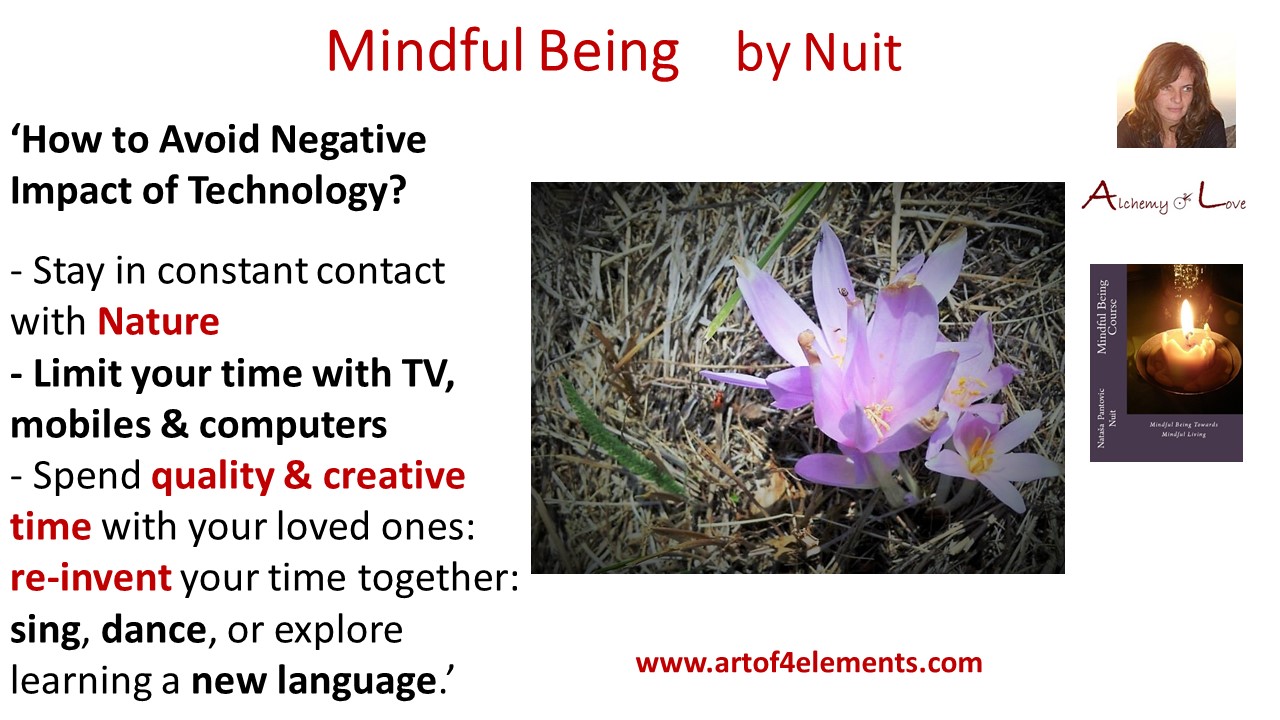Human Brain and Technology
Negative Effects of Technology on the Brain, Children, Society and Relationships Relationships, Mindfulness, Power of Mind, Self Development CourseNegative Effects of Technology on Children, Society and Relationships
Inspired or Lost within Technology Matrix

We live surrounded by an increasingly complex matrix of impulses allowing strangers of all sorts (TV, media, Internet) interfere in our mental, emotional and spiritual development. Understanding this intricate network and how does the human brain interacts with it is becoming our door to happiness and health.
The self or the personality is a bundle of socially influenced traits that emerges and gets formed gradually. We are shaped by our parents and neighbours, by our religion, the media, by various marketing agendas of major corporations, by our state’s politics, by the way we behave or misbehave towards our-own body, our mind, environment, animals and plants, and our planet Earth. So, what would we need to do to understand the importance of a healthy body, to manage our emotions and nurture love for our friends and family, to become aware of how we can make a positive impact on our society or the environment, or discover the purpose of life and ways to be happy?
Negative Effects of Technology on Children
A great deal is known about our behaviour and TV, and our emotions and computer games, because there have been thousands of studies on these subjects. The researchers have all asked the same question: Whether there is a link between exposure to violence (on TV or within a game) and violent behaviour? Most of the studies answered: ‘yes – the link is there’. According to the AAP (American Academy of Pediatrics), ‘Extensive research evidence indicates that media violence can contribute to aggressive behaviour, desensitization to violence, nightmares, and fear of being harmed.’ An average American child will see 200,000 violent acts and 16,000 murders on TV by age 18...
None of us wants to see our children or our loved ones depressed, obese, in front of computers or TV screens at all times, having behavioural problems, being sick, or experiencing attention deficit hyperactivity disorder. However, the rhythm of our lives and our day-to-day habits might have an adverse effect on our mental health.
Negative Effects of Technology on Society
Human brain does some very sophisticated ordering of its incoming nerve impulses. Any information that we are exposed to becomes knowledge when it is translated and related to the personal experience, to the feelings, or desires. When we look at an image, our perception of an image is coloured by our emotions. There is a reciprocal relationship between the area of the brain responsible for logical thinking and the area that is the seat of our emotion. Within the world of technology, numbers, letters, adverts, 'human brain' has to constantly perform little miracles of de-coding, detachment, de-stress, and de-tox to keep us sane and free of diseases. As we grow older, and stronger in our wish to stay healthy and happy, our need for creativity grows, we constantly luck time to be physically active, to read and reflect, to play, and amongst all, we luck the quality time with our friends and family. The interaction with the NET, with the TV, with the computer has replaced the interaction with nature that in its magic way nurtures our cognitive, emotional, physical and psychological well-being.

Negative Effects of Technology on Communication
A group of friends socialising will have a number of mobiles handy on the table, easily within reach for checking e-mails, showing off photos, or answering a call. This invisible ‘best friend’ and inseparable ‘commodity’ could prove to be our ‘worst enemy’...
A recent study by Andrew Przybylski and Netta Weinstein of the University of Essex observed couples of strangers discussing a meaningful topic for 10 minutes with or without a cell phone nearby. The pairs who tried to ‘connect’ in the presence of a cell phone repeatedly reported lower relationship quality and less closeness with the assigned ‘chatting’ partner. The studies suggest that because of the many ‘entertainment’ options phones give us they distort our ability to connect with the people right next to us.
"The presence of a mobile phone may orient individuals to thinking of other people and events outside their immediate social context. In doing so, they divert attention away from a presently occurring interpersonal experience to focus on a multitude of other concerns and interests." said the lead researcher Andrew Przybylski.
A study for the Journal of Behavioural Addictions in the US analysed the data from 191 business students from two universities and revealed that students send on average 110 texts a day, or approximately 3,200 messages a month and check their phones 60 times in a typical day. Nomophobia is the term for people who experience anxiety when they have no access to their mobiles.
Negative Effects of Technology on Relationships

Text messages are used in our romantic and sexual correspondence. A wonderful romantic love letter became obscure. Texting is quick, easy, and convenient and notwithstanding its 160 characters limitation, some people use it to exchange important information with their romantic partner. Messages are often misinterpreted, often edited, forwarded, or written by somebody else. The stress caused by the response expectation is unique for this type of communication. A lack of response to a text message from a potential romantic partner is often deciphered as a form of rejection.
How to Avoid Negative Imapact of Technology
So, how to help our minds stay inspired and enthusiastic and our relationships stay healthy?
- Limit your time with TV, mobiles and computers;
- If you are spending the time with people you really care about, you might want to re-consider the habit of reaching for your phone to reply to a text message or checking your e-mail.
- Spend quality time with your loved ones, re-invent your time together: sing, dance, do art together, or explore learning a new language;
- Experiment, challenge the existent, and stay curious;
Stay in constant contact with nature
Mindfulness is at the heart of many meditations. Mindfulness works with continuous awareness of the body posture and breath; of the feelings, of the thoughts, intentions, images, and of the mental objects that appear during the meditation.
Power of Mind: We are what we believe we are
We are what we believe we are or we are what we pretend to be...
Download Free Tools: Mindfulness Exercises
You can start your journey with us simply downloading the above course materials and working with transformation tools that we have created for you.
If you would ike to experiment, and experience all of the Alchemy of Love Mindfulness Training Tools and Techniques: we will be happy to help you examine your mind (thinking and feeling), your goals and your dreams in our 12 WEEKS SELF DEVELOPMENT COURSE.







Human Brain and Technology No comments on Human Brain and Technology: